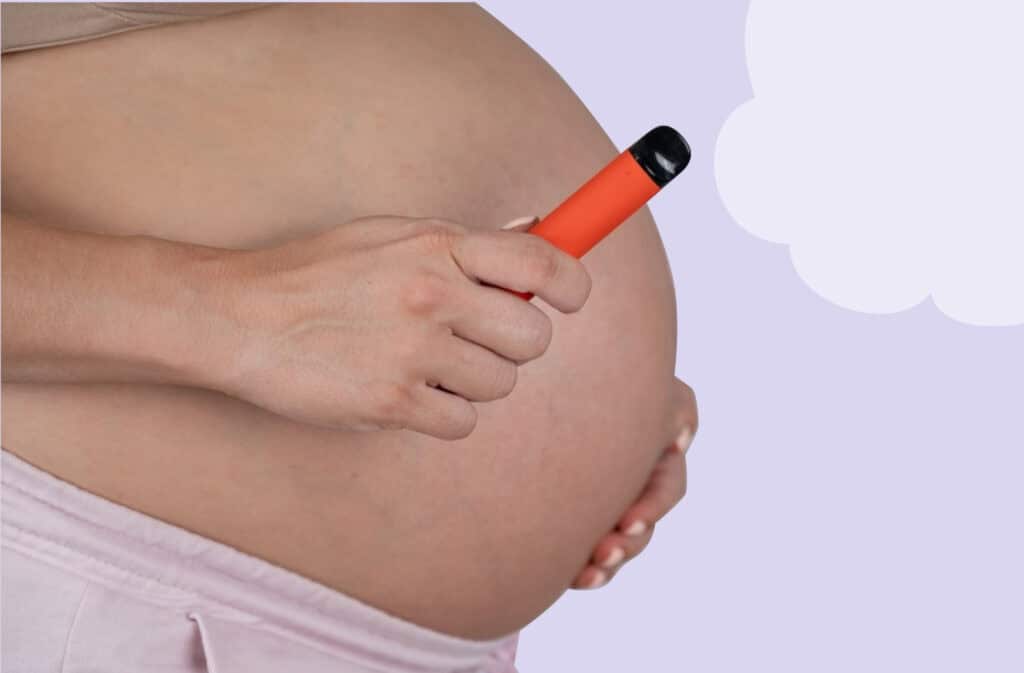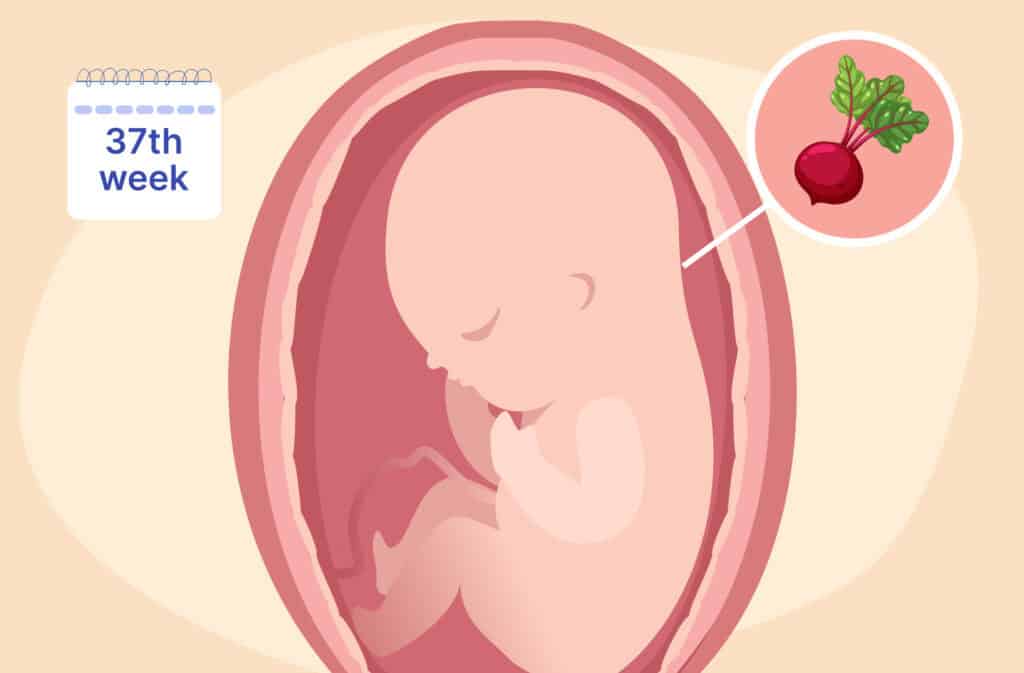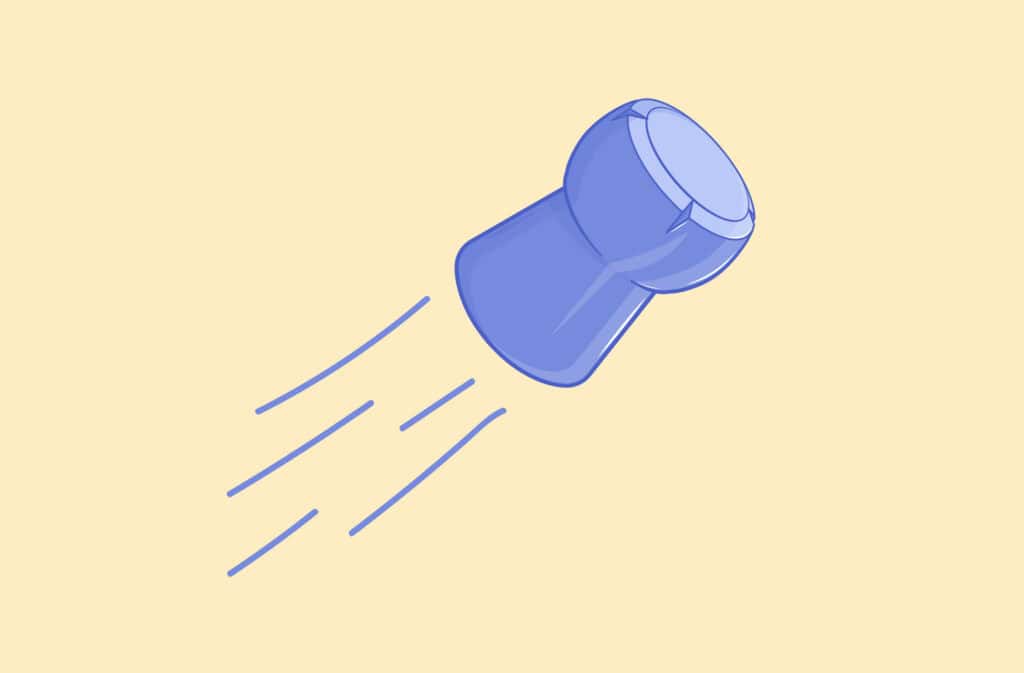Femia > Health Library > Pregnancy > Pregnancy health > Vaping while pregnant: Risks, facts, and what you need to know
Vaping while pregnant: Risks, facts, and what you need to know

- Updated Feb 11, 2025
- Published
CRAFTED BY HUMAN
Crafted by human At Femia, we provide accurate and up-to-date information at every stage of your journey, from trying to conceive, pregnancy and postnatal support. All content is created by a real person based on in-depth research and own professional experience. Femia ensures that you will receive expert advice, strict accuracy and a personalized approach from our authors/medical experts. Learn more about our editorial policy.
FACT CHECKED
Fact checked At Femia Health, we maintain the highest standards of editorial excellence in delivering content focused on helping you conceive, guiding you through pregnancy, and supporting you postpartum. Explore our content review principles to learn how we ensure the accuracy and quality of our health and lifestyle tips for every stage of your journey.
- Vaping while pregnant exposes your baby to harmful chemicals, heavy metals, and nicotine. Even nicotine-free vapes contain harmful chemicals and heavy metals and are not considered safe during pregnancy.
- Exposure to heavy metals and harmful chemicals can have long-term consequences for your baby, including developmental issues.
- Speak to your doctor to access support to help you quit vaping during pregnancy.
Vapes or e-cigarettes were invented as an aid to help smokers quit smoking. They were supposed to help transition people from smokers to non-smokers safely. However, many people have continued to vape long after quitting smoking, and some non-smokers have taken up vaping.
Vaping is still relatively new, so we don’t yet understand the long-term effects. A 2021 research review published in Nicotine and Tobacco Research found insufficient data to make conclusions, meaning we simply don’t yet know what the impact of vaping while pregnant is. For this reason, it’s wise to proceed with caution and avoid vaping during pregnancy to protect your baby’s health.
In this guide, we’ll look at some of the risks of vaping, investigate whether nicotine-free vapes are safer, and provide tips to help you quit.
Femia offers a personalized meal plan, symptom tracking,
and more according to your pregnancy journey
What is vaping and why is it harmful during pregnancy?
Vaping is the inhalation of a mist created by an e-cigarette or vape. Vapes usually contain vaporized liquids (e-liquids) containing flavorings and nicotine, though it is possible to get nicotine-free vapes. If your vape contains nicotine, it is just as addictive as smoking cigarettes. Although many people try vaping as a way to wean themselves off nicotine and traditional cigarettes, most people end up vaping long-term.
Vapes contain nicotine, flavoring agents, and unknown harmful chemicals that can cross the placenta and reach your developing baby. Your baby can become addicted to nicotine in the womb and may suffer withdrawals after birth if you vape during pregnancy.
👉Find out more: Danger signs of pregnancy in the second trimester: What to watch for and when to call your doctor
What happens if you vape while pregnant?
If you’re wondering, “Can you smoke vapes while pregnant?” It may help to understand the risks of vaping while pregnant. Vaping during pregnancy exposes your baby to short- and long-term consequences, including preterm birth. Regular exposure to nicotine during pregnancy can put your baby at risk of experiencing nicotine withdrawal symptoms after birth. If you quit vaping now, you can save your baby from nicotine withdrawal during their early days of life.
Vaping also puts your baby at risk of long-term developmental and behavioral issues in later life. Vaping is relatively new, so scientists haven’t been able to study the lifelong effects of vaping during pregnancy; however, the current evidence highlights the risks associated with vaping.
Vaping while pregnant risks: How does it affect the baby?
Many vapers wonder, ‘Is vaping bad for pregnancy?’ after discovering their pregnancies. According to a 2019 animal study published in Translational Research, nicotine alone can result in disruptions to normal fetal development, affecting all major organ systems. However, the researchers felt the other chemicals in vapes may also have a detrimental impact on fetal development.
Can you vape while pregnant? When you vape, the chemicals in the vape cross the placenta and reach your baby, which puts your baby at risk of a number of issues, including:
Lung development problems
- A 2023 study published in Developmental Biology found that when pregnant mice were exposed to vaping, their baby’s lungs didn’t develop properly.
- A 2016 review published in the American Journal of Respiratory and Critical Care Medicine found that e-cigarettes, like traditional cigarettes, are likely to be harmful to fetal lung development. The authors called for strong warnings before a new generation suffers from lifelong problems caused by vape exposure during pregnancy.
Developmental problems
A 2020 study published in the Lancet found that babies exposed to vaping during pregnancy exhibited abnormal reflexes at one month old. These babies were also less able to self-regulate when compared to the control group whose mothers didn’t vape during pregnancy.
Low birth weight
A 2023 study published in PLoSOne found that mothers who vaped during pregnancy were more likely to have babies with low birth weight. Low birth weight increases your baby’s risk of health problems and infant mortality.
Preterm birth
Vaping is known to increase the risk of preterm birth. A 2021 study published in Maternal-Fetal and Neonatal Medicine found that babies exposed to vaping during pregnancy were more likely to have a lower gestational age at birth. Preterm birth is dangerous because your baby may not be fully developed and may struggle after birth.
Fetal death
A 2023 study published in Preventative Medicine found that using mint and/or menthol-flavored vapes was associated with a higher risk of fetal death.
Can vaping harm a mother's health?
You probably already know vaping is bad for your health, but you may be more motivated to do something about it during pregnancy. Vaping increases your risk of:
Respiratory problems
Vaping is linked with respiratory problems, including shortness of breath, coughing, and lung irritation. We don’t yet know the long-term consequences of vaping, but we do know increasing numbers of vapers are being hospitalized with respiratory problems each year.
Stress
Smokers and vapers often think their habit reduces stress, but the opposite is true. Nicotine addiction can make you stressed and angry and impact your mental health. Giving up vaping could improve your mental health and improve your response to daily stress.
👉Find out more: Which food can cause miscarriage: A comprehensive guide
Is vaping zero nicotine while pregnant safe?
While a nicotine-free vape may sound like a better alternative, they are still filled with harmful chemicals, including formaldehyde, heavy metals, and flavoring agents, which could harm your baby.
Vaping is a relatively recent development, so our understanding of the risks is still in its early stages. However, current evidence suggests that vaping is unsafe during pregnancy.
Femia offers a personalized meal plan, symptom tracking,
and more according to your pregnancy journey
Is vaping better than smoking cigarettes during pregnancy?
We know less about vaping, so at the moment, experts believe traditional cigarettes to be worse for health than vaping. However, both smoking and vaping are unsafe during pregnancy. A study published in the British Medical Journal concluded that pregnant women should be advised not to vape during pregnancy.
If you currently smoke cigarettes and want to use vaping to try and quit, speak to your healthcare provider for advice. They will likely advise that vaping is the better option but that, ideally, you should quit altogether to protect your developing baby. If you know vaping is the only way to stay off cigarettes; then it’s probably the better choice for you and your baby.
Is it bad to vape while pregnant? If you currently vape, it’s time to quit. Vaping during pregnancy puts your baby at risk of harm. Pregnancy is the perfect time to make significant life changes and drop bad habits. What could be more motivating than the new life growing inside you? You can quit nicotine cold turkey during pregnancy; your baby will not suffer withdrawal symptoms in utero.
How to quit vaping while pregnant
Quitting vaping during pregnancy won’t be easy, but you can do it. Here are some tips to help you succeed:
1. Speak to your healthcare provider for support
Your healthcare provider has the resources, experience, and knowledge to help you quit. Don’t be afraid to reach out to your healthcare provider for support; they’ll be more than happy to help you quit vaping to protect your baby.
Your doctor might recommend nicotine replacement therapies (NRT) to wean you off nicotine. It’s worth noting, however, that these are often less effective during pregnancy because nicotine is metabolized fast during pregnancy, and the NRT product doses don’t take this into account. Alternatively, they may offer you behavioral therapies or access to a support group for pregnant women giving up vaping and smoking.
2. Keep your motivation in mind
Your baby is about to shake up your whole world, so why not start while they’re still in utero? Make a promise to your baby and keep it. Arm yourself with facts about how smoking could harm your baby to keep you motivated. Each time you experience a craving, tackle it by focusing instead on the fantastic thing you’re doing to protect your baby’s health.
3. Distract yourself during cravings
Nicotine is addictive, so you’re going to experience withdrawal symptoms and cravings when you quit. The cravings might feel strong initially, but if you ignore them, they’ll weaken and cease altogether. Figure out something you can do to distract yourself when the cravings hit. Some people choose to chew gum or have a lollipop, for example. Each time you successfully ignore a craving, you are beating your addiction.
4. Expect it to be hard
It’s tough to give up something you’re addicted to, so don’t expect quitting to be a piece of cake. You can do it, though, so don’t lose hope. Expecting it to be hard might help you overcome challenges along the way.
5. Avoid triggers
The first couple of weeks will be the hardest; after that, you’ll find it much easier to get on with your life without vaping. However, it’s worth taking a step back from triggers for the first couple of weeks. If your friends vape constantly, ask them not to vape around you while you’re giving up. Try to shake up your routine so you don’t notice the lack of vaping so much. Find other ways to fill your break times at work, such as phoning a friend or going for a short walk to increase your step count.
6. Use an app to track the time
Quitting vaping is worth celebrating, so use an app to track your progress. At first, you might be counting in hours, but soon enough, it will be days, then weeks, and then months. Eventually, you’ll stop counting altogether because you will have got over your cravings for good.
Questions from the Femia community
Is vaping cannabis or CBD safe during pregnancy?
No, vaping cannabis or CBD is not safe during pregnancy. Vaping cannabis or CBD exposes your baby to harmful chemicals which may impact development. You should avoid cannabis and cannabis products during pregnancy.
Can vaping THC harm my baby during pregnancy?
Yes, THC is known to cross the placenta, where it can impact fetal brain development. Vaping THC during pregnancy puts your baby at risk of cognitive and behavioral issues.
Are there risks associated with vaping flavored or herbal products during pregnancy?
For sure. While the word herbal connotates images of nature, a herbal vape may contain toxic chemicals and heavy metals that can harm your developing baby.
The bottom line
Many women who continue to vape during pregnancy believe it to be a healthier option than smoking traditional cigarettes; however, neither is considered safe during pregnancy. Vaping poses risks to you and your developing baby.
Nicotine is known to pose significant harm to developing babies. On top of this, vapes contain unknown harmful chemicals which may impact your child’s development.
Pregnancy is a perfect time to make a change. You have a belly full of motivation, healthcare professionals on hand to support you, and plenty of research to help you decide to quit. Reach out to your healthcare provider for support; they can recommend tried and tested support programs for pregnant women.
References
- Ammar, L et al. Electronic cigarette use during pregnancy and the risk of adverse birth outcomes: A cross-sectional surveillance study of the US Pregnancy Risk Assessment Monitoring System (PRAMS) population. PLoS One. Published: October 24, 2023 https://doi.org/10.1371/journal.pone.0287348.
- Froggatt, S et al.The effects of prenatal cigarette and e-cigarette exposure on infant neurobehaviour: A comparison to a control group eClinicalMedicine, Volume 28, 100602 https://www.thelancet.com/journals/eclinm/article/PIIS2589-5370(20)30346-1/fulltext.
- Hawkins, S. S., Wylie, B. J., & Hacker, M. R. (2021). Associations between electronic nicotine delivery systems and birth outcomes. The Journal of Maternal-Fetal & Neonatal Medicine, 35(25), 6868–6875. https://doi.org/10.1080/14767058.2021.1929156.
- Kim, S., Oancea, S.C. Electronic cigarettes may not be a “safer alternative” of conventional cigarettes during pregnancy: evidence from the nationally representative PRAMS data. BMC Pregnancy Childbirth 20, 557 (2020). https://doi.org/10.1186/s12884-020-03247-6.
- Orzabal MR, et al. Chronic exposure to e-cig aerosols during early development causes vascular dysfunction and offspring growth deficits. Transl Res. 2019 May;207:70-82. doi: 10.1016/j.trsl.2019.01.001. Epub 2019 Jan 7. PMID: 30653941; PMCID: PMC6486852. https://pmc.ncbi.nlm.nih.gov/articles/PMC6486852/.
- Shuo-yu Lin, et al. E-cigarette use during pregnancy and its association with adverse birth outcomes in the US, Preventive Medicine, Volume 166, 2023, 107375, ISSN 0091-7435, https://doi.org/10.1016/j.ypmed.2022.107375.
- Spindel ER, McEvoy CT. The Role of Nicotine in the Effects of Maternal Smoking during Pregnancy on Lung Development and Childhood Respiratory Disease. Implications for Dangers of E-Cigarettes. Am J Respir Crit Care Med. 2016 Mar 1;193(5):486-94. doi: 10.1164/rccm.201510-2013PP. PMID: 26756937; PMCID: PMC4824926. https://pmc.ncbi.nlm.nih.gov/articles/PMC4824926/.
- Ussher, M., Fleming, J. & Brose, L. Vaping during pregnancy: a systematic review of health outcomes. BMC Pregnancy Childbirth 24, 435 (2024). https://doi.org/10.1186/s12884-024-06633-6.
- Whittington, Julie R. MD, et al. The Use of Electronic Cigarettes in Pregnancy: A Review of the Literature. Obstetrical & Gynecological Survey 73(9):p 544-549, September 2018. | DOI: 10.1097/OGX.0000000000000595 https://journals.lww.com/obgynsurvey/Abstract/2018/09000/The_Use_of_Electronic_Cigarettes_in_Pregnancy__A.19.aspx.
- Yunus H. Ozekin, et al. Intrauterine exposure to nicotine through maternal vaping disrupts embryonic lung and skeletal development via the Kcnj2 potassium channel, Developmental Biology, Volume 501, 2023, Pages 111-123, ISSN 0012-1606, https://doi.org/10.1016/j.ydbio.2023.06.002.

At 37 weeks pregnant, you are still early term. Learn about labor signs, baby development, and tips for managing discomfort.

Are you wondering what to pack in hospital bag for mom? Click to find an all-rounded guide with a checklist to prepare for labor and delivery thoroughly!

Discover things to avoid after losing mucus plug and what to do next. Learn how long after losing mucus plug labor starts and what happens to your body. Expert advice from Femia.

